
World Leisure Journal
Scope & Guideline
Advancing Knowledge in Leisure Studies and Beyond
Introduction
Aims and Scopes
- Interdisciplinary Research:
The journal embraces a wide array of disciplines including sociology, psychology, public health, and environmental studies, encouraging the integration of various methodologies to study leisure phenomena. - Focus on Well-being and Quality of Life:
There is a strong emphasis on how leisure activities contribute to individual and community well-being, mental health, and overall quality of life, particularly in marginalized or disadvantaged communities. - Cultural and Social Dimensions of Leisure:
The journal explores the social and cultural contexts of leisure, including gender, race, and community dynamics, highlighting how these factors influence leisure participation and experiences. - Impact of Global Challenges:
Research often addresses the implications of global challenges such as climate change, pandemics, and urbanization on leisure practices, emphasizing adaptive strategies and resilience. - Emerging Leisure Trends:
The journal is keen on exploring new leisure trends, such as digital nomadism, the role of technology in leisure, and the evolving nature of work-leisure relationships.
Trending and Emerging
- Digital Leisure and Technology:
There is an increasing focus on how technology influences leisure activities, including the rise of digital nomadism, online gaming, and social media's impact on leisure experiences. - Leisure and Social Justice:
Emerging discussions emphasize the role of leisure in promoting social justice, addressing inequalities related to gender, race, and accessibility in leisure participation. - Health and Well-being During Crisis Events:
The COVID-19 pandemic has brought a surge of interest in the relationship between leisure and mental health, prompting research on how leisure can serve as a coping mechanism during crises. - Environmental Sustainability in Leisure:
Studies increasingly address the environmental impacts of leisure activities, promoting sustainable practices and the significance of nature-based recreation in fostering ecological awareness. - Multispecies and Non-Human Perspectives:
There is a growing trend towards incorporating multispecies perspectives in leisure studies, exploring human-animal relationships and the role of non-human entities in leisure experiences.
Declining or Waning
- Traditional Sports and Recreation:
There is a noticeable decline in the exploration of traditional sports and recreational activities, possibly overshadowed by the rise of new leisure forms such as digital gaming and online experiences. - Static Models of Leisure Participation:
Research that relies on static models for understanding leisure participation is becoming less frequent, as scholars increasingly seek dynamic frameworks that account for changing contexts and individual experiences. - Regional Focus on Western Leisure Practices:
The journal has seen a decrease in papers specifically focused on Western leisure practices, as there is a growing interest in global perspectives and leisure experiences from the Global South. - Narrow Definitions of Leisure:
There is a diminishing trend towards narrow definitions of leisure that do not encompass broader societal and cultural implications, as the discourse shifts toward more inclusive and holistic understandings.
Similar Journals

Acta Turistica
Elevating the Dialogue in Tourism and Leisure StudiesActa Turistica is a specialized academic journal based in Croatia, published by EKONOMSKI FAK SVEUCILISTA, KATEDRA TRGOVINU & TURIZAM. Focused on the interdisciplinary domains of tourism, leisure, and hospitality management, this journal serves as a vital platform for researchers, professionals, and students aiming to contribute to the evolving landscape of these fields. With an ISSN of 0353-4316 and an E-ISSN of 1848-6061, it is indexed in various databases, although it currently does not offer an open access option. Despite being categorized in the Q4 quartile across multiple disciplines as of 2023—including Economics, Geography, and Tourism—the journal is poised to publish significant findings that could enhance knowledge and practices within these sectors. Its Scopus rankings highlight the need for growth and improvement, especially within its niche markets. As it converges from 2018 to 2024, Acta Turistica invites high-quality research that addresses pressing issues in travel and tourism, advocating for innovation and sustainable practices in a rapidly changing global environment.
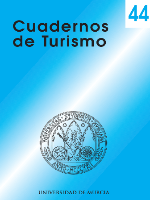
Cuadernos de Turismo
Exploring sustainable tourism through interdisciplinary insights.Cuadernos de Turismo is a peer-reviewed academic journal published by Universidad de Murcia, focusing on the interdisciplinary fields of geography, tourism, and environmental conservation. Since its inception in 1998, this Open Access journal has provided a platform for researchers, professionals, and students to share innovative research and insights in the domains of tourism, leisure, and sustainable landscape management. Leveraging its Q4 ranking across multiple categories in 2023, Cuadernos de Turismo stands as a crucial resource for exploring contemporary challenges and developments in tourism and its implications for regional planning and environmental conservation. With its commitment to accessibility and scholarly communication, the journal fosters collaboration and dialogue among scholars and practitioners globally, making significant contributions to the understanding and development of sustainable tourism practices.
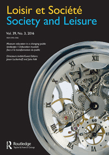
LOISIR & SOCIETE-SOCIETY AND LEISURE
Advancing Insights at the Intersection of Leisure and SociologyLOISIR & SOCIETE-SOCIETY AND LEISURE, published by Taylor & Francis Ltd, is a distinguished journal that provides a platform for research at the intersection of leisure studies, sociology, and political science. With a rich history spanning from 1978 to 2024, this journal seeks to explore the multifaceted roles of leisure within society and its implications for social dynamics. Although the journal's current impact factor remains under development, its categorization in the Q4 quartile for both Metals and Alloys, as well as Sociology and Political Science, reflects its ongoing contribution to these fields. Engaging researchers, professionals, and students alike, LOISIR & SOCIETE invites submissions that critically address the social contexts of leisure, promoting dialogue and exploration of contemporary socio-political issues. The journal's commitment to access may vary, ensuring diverse perspectives are presented within its pages, thus emphasizing its significance in advancing scholarly discussion on leisure."
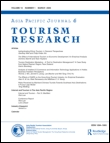
Asia Pacific Journal of Tourism Research
Advancing the Future of Tourism ResearchAsia Pacific Journal of Tourism Research is a premier academic journal dedicated to advancing knowledge in the fields of tourism, leisure, and hospitality management. Published by ROUTLEDGE JOURNALS, TAYLOR & FRANCIS LTD, and based in the United Kingdom, this journal has established itself as a leading voice in research ranging from sustainable tourism practices to the socio-economic impacts of travel in the Asia Pacific region. With an impressive Q1 ranking in both Geography and Tourism categories for 2023, it boasts a Scopus rank of #77 out of 821 in Geography and #32 out of 146 in Tourism, emphasizing its critical role in the academic community. Researchers, professionals, and students can benefit from its insights and findings, making it an essential resource for anyone involved in the tourism sector. The journal's commitment to fostering innovative research contributes significantly to our understanding of tourism dynamics from 2003 to 2024 and beyond.

International Journal of Event and Festival Management
Advancing the Art of Event and Festival ManagementInternational Journal of Event and Festival Management, published by Emerald Group Publishing Ltd, is a leading academic journal dedicated to advancing knowledge and insights in the fields of event management and festival studies. With an ISSN of 1758-2954 and E-ISSN 1758-2962, this esteemed journal serves as a critical resource for researchers, practitioners, and students interested in exploring the complexities of event and festival management within the broader context of Business, Management, and Accounting and Tourism, Leisure and Hospitality Management, as evidenced by its impressive Q2 quartile ranking in both categories. The journal's focus on high-quality research and real-world applications contributes to its solid position in the academic community, reflected in its Scopus rankings (General Business, Management and Accounting: Rank #88/218; Tourism, Leisure and Hospitality Management: Rank #74/146). With its strong commitment to fostering innovative discourse and providing practical insights, the International Journal of Event and Festival Management plays a vital role in shaping the future of the field, making it an essential read for those aiming to thrive in this dynamic landscape. This journal not only encourages scholarly contributions but also ensures a platform for professionals to stay abreast of the latest trends and practices.

Almatourism-Journal of Tourism Culture and Territorial Development
Illuminating Cultural Dimensions of TravelAlmatourism - Journal of Tourism Culture and Territorial Development, ISSN 2036-5195, is an esteemed academic journal published by UNIV STUDI BOLOGNA POLO SCIENTIFICO-DIDATTICO RIMINI. Operating under an Open Access model since 2009, this journal aims to promote and disseminate high-quality research in the interdisciplinary field of tourism, examining its cultural dimensions and the impact on territorial development. With a commitment to enhancing knowledge around sustainable tourism practices and cultural heritage, Almatourism serves as a vital platform for researchers, academic professionals, and students alike, facilitating collaboration and stimulating innovative discussions. Its dedication to accessibility ensures that findings are available to a global audience, contributing significantly to the ongoing dialogue surrounding tourism's role in society. The journal's pivotal contributions to the field underscore its importance as a resource for advancing understanding and practice within the dynamic and ever-evolving landscape of tourism.
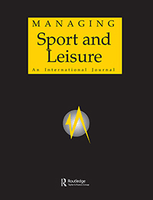
Managing Sport and Leisure
Bridging research and practice in leisure management.Welcome to Managing Sport and Leisure, a distinguished academic journal published by Routledge Journals, Taylor & Francis Ltd. With an ISSN of 2375-0472 and an E-ISSN of 2375-0480, this journal is a vital resource for professionals, researchers, and students within the fields of Tourism, Leisure, and Hospitality Management. Currently ranked in the Q2 category for 2023, it occupies a prestigious position at #39 out of 146 in the Scopus rankings, placing it in the 73rd percentile of its field. Since its inception in 2015, Managing Sport and Leisure has been dedicated to addressing contemporary challenges and innovations in managing sporting events, leisure activities, and related industries. The journal fosters a multidisciplinary approach, ensuring that readers are equipped with insights and empirical research that can influence policy and practice. Although it operates under a subscription model, the journal remains accessible to a wide audience seeking depth and rigor in research. Its offerings are crucial for advancing knowledge and practice in this dynamic field, supporting the development of effective strategies that enhance sporting and leisure experiences globally.
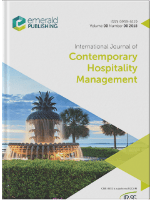
International Journal of Contemporary Hospitality Management
Advancing Knowledge in Hospitality ManagementThe International Journal of Contemporary Hospitality Management, published by Emerald Group Publishing Ltd, stands as a leading peer-reviewed journal in the field of hospitality management, tourism, and leisure. With an impressive Scopus rank of #11 out of 146, placing it in the top 92nd percentile of its category, this journal has established a firm foothold in the academic community since its inception in 1989. The journal publishes high-quality research that addresses contemporary issues affecting the hospitality and tourism sectors, making it an essential resource for researchers, industry professionals, and students alike. Although it does not operate under an open access model, the journal ensures wide reach and readership through its comprehensive subscription service. The International Journal of Contemporary Hospitality Management continues to play a pivotal role in advancing knowledge and best practices within the dynamic landscape of hospitality, leisure, and tourism management.
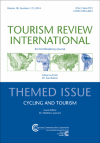
Tourism Review International
Exploring the Future of Tourism and HospitalityTourism Review International, published by COGNIZANT COMMUNICATION CORP, stands as a pivotal resource in the field of Tourism, Leisure, and Hospitality Management. With an ISSN of 1544-2721 and an E-ISSN of 1943-4421, this journal has been delivering insightful research and analyses since its inception. Having achieved a commendable Q3 ranking in the 2023 Scopus category, it holds the 72nd position out of 146 in its field, featuring an engaging array of studies that contribute to understanding contemporary trends and challenges within the tourism industry. The journal seeks to publish high-quality, peer-reviewed articles that offer meaningful insights into tourism practices, policy implications, and innovative strategies, making it essential reading for researchers, professionals, and students passionate about the evolution of tourism. With access options tailored to facilitate scholarly communications and knowledge dissemination, Tourism Review International continues to foster a vibrant academic community dedicated to advancing the discourse in tourism and hospitality worldwide.

Podium-Sport Leisure and Tourism Review
Fostering impactful scholarship in sport and leisure.Podium-Sport Leisure and Tourism Review is a distinguished academic journal dedicated to advancing the fields of sport, leisure, and tourism studies. Published by UNIV NOVE JULHO, this journal has been a pivotal resource for researchers, practitioners, and students since it became an Open Access publication in 2012, ensuring broad dissemination of knowledge and fostering engagement across disciplines. With a commitment to high-quality scholarship, Podium addresses contemporary issues and innovations in leisure and tourism management, making it an essential platform for those eager to explore the dynamic interplay between sports and societal trends. Based in São Paulo, Brazil, the journal champions global perspectives while offering a local context, aiming to enrich the discourse within its fields. Although specific metrics such as HIndex and quartile rankings are not provided, the journal remains focused on facilitating impactful research and professional practice, serving as a vital conduit for knowledge exchange in sport and tourism.